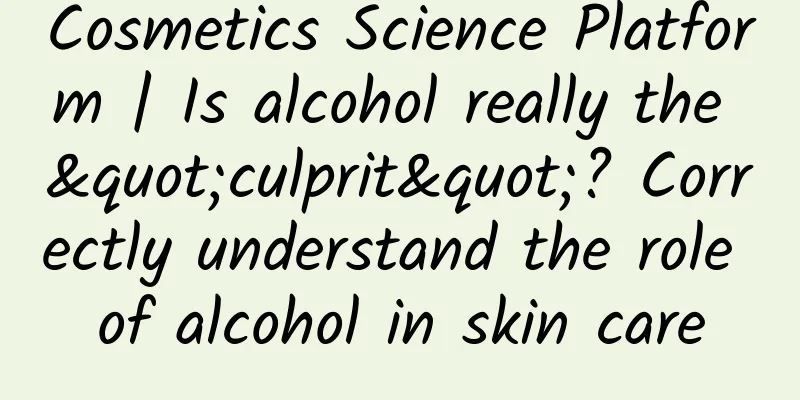Cosmetics Science Platform | Is alcohol really the "culprit"? Correctly understand the role of alcohol in skin care

|
When it comes to alcohol in skin care products, many people frown, thinking that it is the "culprit" that causes dry, sensitive skin and even accelerates aging. But in fact, the role of alcohol in skin care products is not so simple. It is more like a "double-edged sword". If used well, it can add icing on the cake, but if used poorly, it will have the opposite effect. 1. The positive role of alcohol in skin care products: 1. Promote penetration: Alcohol can act as a solvent to help some active ingredients penetrate deeper into the skin and achieve the effects of skin care products. 2. Refreshing oil control: Alcohol evaporates quickly and can bring a refreshing feeling. It is especially suitable for oily skin, helping to control oil and tighten pores. 3. Bactericidal and anti-inflammatory: Alcohol has bactericidal and anti-inflammatory effects and can be used to treat skin problems such as acne and blackheads. Second, the negative effects of alcohol: 1. Dry skin: Alcohol will dissolve the oil on the surface of the skin. Long-term use of skin care products with high concentrations of alcohol may cause dry skin and damaged skin barrier. 2. Irritation and sensitivity: Alcohol is somewhat irritating to the skin. Sensitive skin may experience discomfort such as redness and stinging after use. 3. Accelerated aging: Some studies have shown that long-term use of skin care products with high concentrations of alcohol may damage the skin barrier, cause moisture loss, and accelerate skin aging. 3. How to correctly view and use alcohol-containing skin care products? 1. Look at it rationally: Don’t reject alcohol blindly, and don’t blindly pursue “alcohol-free” products. The key lies in the concentration and formula of the alcohol. 2. Choose according to skin type: Oily skin and acne skin can use alcohol-containing skin care products appropriately, but sensitive skin and dry skin should try to avoid them. 3. Pay attention to the frequency of use: Even for skin with good tolerance, it is not recommended to use skin care products with high concentration of alcohol for a long time. 4. Pay attention to the ingredient list: The higher the alcohol is ranked in the ingredient list, the higher the content. You can choose products with lower alcohol content and combined with moisturizing and soothing ingredients. 5. If you are sensitive to alcohol, you can choose to use products containing denatured alcohol, which is relatively less irritating. After using alcohol-containing skin care products, it is recommended to strengthen moisturizing and use moisturizing products containing ingredients such as ceramide and cholesterol to help repair the skin barrier. Conclusion: Alcohol is not a terrible thing. Its role in skin care products depends on its concentration, formula and individual skin condition. Only by looking at it rationally and making scientific choices can alcohol become a good helper in your skin care journey, rather than the "culprit". Do the cosmetics you use on a daily basis contain alcohol? How effective are they? Feel free to share your experience in the comments section. |
<<: After taking an X-ray after a fracture, why do we sometimes need to do a CT scan?
Recommend
Can girls still grow taller at the age of 18?
What should I do if an 18-year-old girl is still ...
Endometriosis surgery diagram
Under normal circumstances, the uterine wall cove...
What is the cause of female ovulation and implantation bleeding?
Implantation bleeding in women is relatively rare...
Causes of bulge in female occipital region
Many women's insomnia, constipation, etc. are...
There are so many benefits to sunbathing for a while every day! It is simply a free "health supplement"
How much Sichuan people love to sunbathe When the...
Is a breast lump a tumor?
Women often have breast lumps, which is generally...
What if my period only came for one day?
Menstruation is a condition that every woman has,...
What is the cause of uterine cysts?
The appearance of uterine cysts also catches many...
What are the benefits of eating grilled lamb chops? The nutritional value of lamb chops
The weather in the north has been very cold recen...
Can I test for pregnancy with only my morning urine?
Pregnancy is great news for newlyweds, as it mean...
Treatment for acne on face during menstruation
We know that female friends are prone to various ...
Top 30 Chinese non-game companies and app developers with the highest overseas revenue in August 2023
The ranking of Chinese non-game companies and appl...
Is it better to go to a hospital or a beauty salon to get your ears pierced? Which department should I go to when getting my ears pierced?
In life, many girls will pierce their ears to loo...









